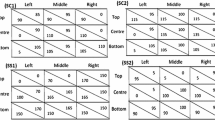Abstract
We report on an experiment in which subjects choose actions in strategic games with either strategic complements or substitutes against a granny, a game theorist or other subjects. The games are selected in order to test predictions on the comparative statics of equilibrium with respect to changes in strategic ambiguity. We find that subjects face higher ambiguity while playing against the granny than playing against the game theorist if we assume that subjects are ambiguity averse. Moreover, under the same assumption, subjects choose more secure actions in games more prone to ambiguity which is in line with the predictions.
Similar content being viewed by others
References
Bewley, T.F. (1986), Knightian decision theory: Part I, Cowles Foundation Discussion Paper 807.
Camerer, C. and Karjalainen, R. (1994), Ambiguity-aversion and non-additive beliefs in non-cooperative games: Experimental evidence, in, Munier, B. and Machina, M. (eds.), Models and Experiments in Risk and Rationality, Kluwer Academic Publishers, pp. 325–358.
Camerer C., Weber M. (1992) Recent developments in modelling preferences: Uncertainty and ambiguity. Journal of Risk and Uncertainty 5: 777–795
Dow J., da Costa Werlang S.R. (1994) Nash equilibrium under Knightian uncertainty: Breaking down backward induction. Journal of Economic Theory 64, 305–324
Eichberger J., Kelsey D. (2000) Non-additive beliefs and strategic equilibria. Games and Economic Behavior 30, 183–215
Eichberger J., Kelsey D. (2002) Strategic complements, substitutes and ambiguity: The implications for public goods. Journal of Economic Theory 106: 436–466
Eichberger J., Kelsey D. (2005) Optimism and pessimism in games. mimeo., University of Exeter.
Eichberger J., Kelsey D., Schipper B.C. (2006) Ambiguity and social interaction. mimeo., University of California, Davis
Epstein L. (1997) Preference, rationalizability and equilibrium. Journal of Economic Theory 73, 1–29
Fischbacher, U. (1999), z-Tree-Zurich toolbox for readymade economic experiments—experimenter’s manual, mimeo., University of Zurich.
Gilboa I., Schmeidler D. (1989) Maxmin expected utility with a non-unique prior. Journal of Mathematical Economics 18, 141–153
Groes E., Jacobson H.J., Sloth B., Tranæs T. (1998) Nash equilibrium with lower probabilities. Theory and Decision 44, 37–66
Haller H. (2000) Non-additive beliefs in solvable games. Theory and Decision 49, 313–338
Klibanoff, P. (1996), Uncertainty, decision, and normal form games, mimeo., Northwestern University.
Lo K.C. (1999) Nash equilibrium without mutual knowledge of rationality. Economic Theory 14, 621–633
Lo K.C. (1996) Equilibrium in beliefs under uncertainty. Journal of Economic Theory 71, 443–484
Marinacci M. (2000) Ambiguous games. Games and Economic Behavior 31, 191–219
Miller G. (1956) The magical number seven, plus or minus two. Psychological Review 63, 81–97
Mukerji, S. (1997), A theory of play for games in strategic form when rationality is not common knowledge, mimeo.
Ryan M. (2002) What do uncertainty-averse decision-makers believe?. Economic Theory 20, 47–65
Schmeidler D. (1989) Subjective probability and expected utility with additivity. Econometrica 57, 571–587
Author information
Authors and Affiliations
Corresponding author
Rights and permissions
About this article
Cite this article
Eichberger, J., Kelsey, D. & Schipper, B.C. Granny Versus Game Theorist: Ambiguity in Experimental Games. Theor Decis 64, 333–362 (2008). https://doi.org/10.1007/s11238-007-9053-3
Received:
Accepted:
Published:
Issue Date:
DOI: https://doi.org/10.1007/s11238-007-9053-3
Keywords
- Choquet expected utility
- equilibrium under ambiguity
- experiments
- Knightian uncertainty
- strategic uncertainty




